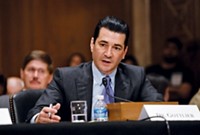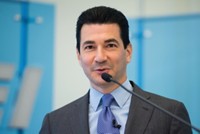Advertisement
Grab your lab coat. Let's get started
Welcome!
Welcome!
Create an account below to get 6 C&EN articles per month, receive newsletters and more - all free.
It seems this is your first time logging in online. Please enter the following information to continue.
As an ACS member you automatically get access to this site. All we need is few more details to create your reading experience.
Not you? Sign in with a different account.
Not you? Sign in with a different account.
ERROR 1
ERROR 1
ERROR 2
ERROR 2
ERROR 2
ERROR 2
ERROR 2
Password and Confirm password must match.
If you have an ACS member number, please enter it here so we can link this account to your membership. (optional)
ERROR 2
ACS values your privacy. By submitting your information, you are gaining access to C&EN and subscribing to our weekly newsletter. We use the information you provide to make your reading experience better, and we will never sell your data to third party members.
Business
BIO Goes To Washington
Biopharmaceuticals: Annual conference focuses on need for regulatory and policy reform
by Rick Mullin
July 4, 2011
| A version of this story appeared in
Volume 89, Issue 27

Discussions at the BIO International Convention, sponsored by the Biotechnology Industry Organization in Washington, D.C., last week, centered on regulatory challenges to innovation, with conference speakers and attendees lamenting a rigid approval process for bringing new drugs to market. Others pointed to the lack of a clear approval framework for generic biopharmaceuticals, also known as biosimilars.
Attendees also noted continued tightness in the venture capital market, a major source of sustenance for the many biotech firms that have yet to bring a product to market, as an impediment to research this year.
According to Ernst & Young’s recently released annual report on the global biotechnology sector, overall investment in the sector continues to rebound from a steep decline in 2009, but the majority of small biotech companies fared worse in 2010 than in 2009. Firms in the U.S., Europe, and Canada raised $25 billion in 2010, nearly on par with levels attained in the years preceding the economic crisis, said Gautam Jaggi, managing editor of the report. Jaggi noted, however, that in the U.S., 82.6% of the capital was raised by just 20% of the companies.
Speaking on a panel hosted by the consulting firm, Paul J. Hastings, CEO of the biopharmaceutical company OncoMed Pharmaceuticals, claimed that the current financial and regulatory environment is contributing to a risk aversion that is hampering drug research. “Disruptive innovation can’t happen without easing of the regulatory environment,” he said.
In a panel discussion on research partnerships in which FDA Commissioner Margaret A. Hamburg joined Eli Lilly & Co. CEO John C. Lechleiter, NIH Director Francis S. Collins, and others, Hamburg acknowledged the need to expedite biotech drug approvals. “We need to strengthen regulatory science and fill gaps in our knowledge to develop swift, fully efficient ways to bring drugs to market,” she said. “Our fundamental goal is full transparency.”
Hamburg told C&EN that delays in establishing a framework to approve biosimilars in the U.S. “reflect the complexity of the science that’s come before us.” Just as FDA is struggling with the science, she said, drugmakers are finding it challenging to produce stable, reproducible biosimilar compounds.
At the meeting, BIO CEO James C. Greenwood, a former congressman, introduced a raft of recommendations for regulatory and policy reform. Among other things, BIO is calling for the establishment of an external review board to conduct periodic assessments of FDA management, structure, and procedures, as well as a system of staged drug approval that would provide patients with illnesses for which there are no adequate therapies access to promising treatments in development.
BIO also advocates an angel investor tax break that would provide a 50% credit for individuals investing in small companies doing qualified research.





Join the conversation
Contact the reporter
Submit a Letter to the Editor for publication
Engage with us on Twitter